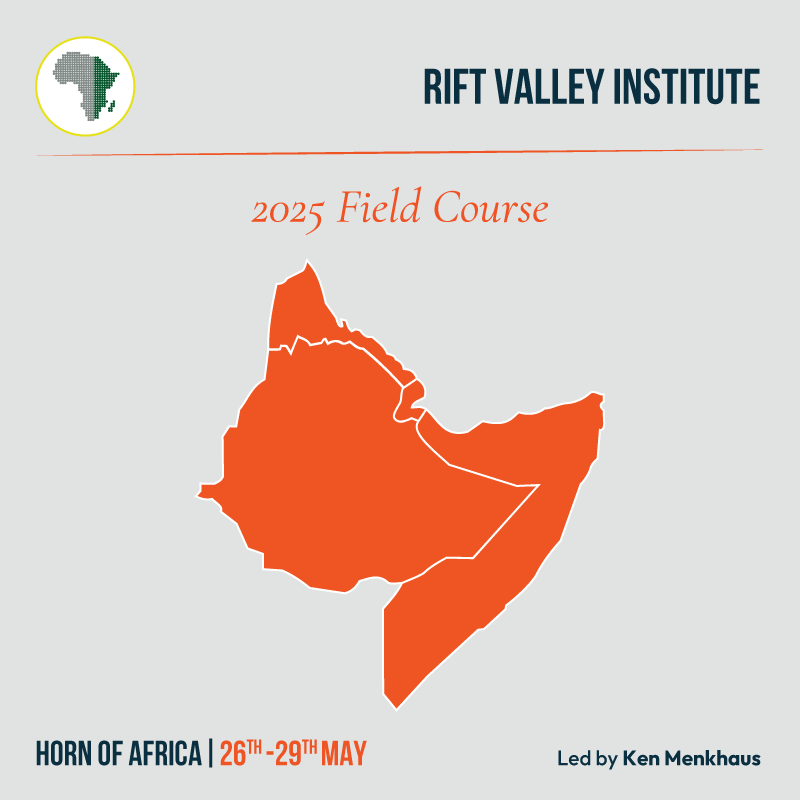
26-29 MAY 2025
THEME: TURBULENT WATERS IN THE HORN
Led by Ken Menkhaus
The Horn of Africa is entering a fifth year of extreme turbulence, a period that is testing the resilience of its states and citizens. The onset of the era of crisis began with the 2020 COVID pandemic and Ethiopia’s bloody Tigray war and has not abated. Today, the region is roiled by armed conflict, unrest and fragmentation within states, deep political tensions between states and the spillover of violence, forced displacement of populations, climate crisis and terrorism across state lines.
The expression ‘turbulent waters’ is a metaphor for an environment that is difficult to navigate politically, but we chose the expression as the theme for the RVI Horn of Africa course 2025 for its literal meaning as well. Never have the waters emanating from and surrounding the Horn been such a source of tension and conflict, from dangerous disputes over the Nile waters to global and regional contestation over the region’s increasingly valuable seaports, fisheries and offshore oil in the Red Sea and Indian Ocean. This year’s course will include sessions devoted to the region’s many ‘water wars’ and what they reveal about wider political economy dynamics in the Horn of Africa.
Director of Studies
Dr Ken Menkhaus | C. Louise Nelson Professor of Political Science, Davidson College
Ken specializes in Somalia and the Horn of Africa, and has published in the fields of development, conflict analysis, humanitarian response, peace operations, peacebuilding, state building and violent extremism. His work involves both academic research and policy work with the US government, the United Nations, the World Bank and non-governmental organizations.
Key Teaching Team
Michael Woldemariam | Associate Professor, School of Public Policy at the University of Maryland, Senior Fellow, Center for International & Security Studies at Maryland
Michael’s teaching and research interests are in African security studies, with a particular focus on armed conflict in the Horn of Africa. Michael’s scholarly work has been published in a wide-range of peer-reviewed journals and his popular essays have appeared in outlets such as Foreign Affairs, Foreign Policy and Current History. His first book, Insurgent Fragmentation in the Horn of Africa: Rebellion and Its Discontents, was published with Cambridge University Press in 2018. In addition to his scholarly work, Michael has consulted with a number of international organizations, primarily on issues related to politics, governance and security in the Greater Horn of Africa region. He holds a BA from Beloit College, and MA and PhD degrees from Princeton University.
Jason Mosley | Senior Manager, Publications and Information, Rift Valley Institute (RVI)
With more than 20 years of field experience in the Horn of Africa, Jason has undertaken a range of policy and academic research consultancies, focused on political economy issues across the region. He is a Research Associate at the African Studies Centre, Oxford University and Managing Editor of the Journal of Eastern African Studies. He was an Associate Senior Researcher with SIPRI’s Con ict, Peace and Security area from 2020-25, and an Associate Fellow of the Africa Programme at Chatham House from 2012-18. Prior to this, Jason was the Senior Analyst for Africa at Oxford Analytica from 2005-12. He has an MA in African Studies from SOAS, University of London.
Dereje Feyissa | Associate Professor at Addis Ababa University, Guest Professor at University of Tuebingen, Germany
Dereje holds a PhD in Social Anthropology from Martin Luther University, Germany. He was a research fellow of the Max Planck Institute for Social Anthropology in Germany and University of Osaka in Japan. Dereje’s research interests include centre-periphery relations and state formation in Ethiopia, political transition and political economy of development. He is the author and editor of books and several articles in peer-reviewed journals. To mention some of his books and edited books: Migration as a collective project – the experience of Hadiya migration to South Africa (forthcoming, Routledge); Ethiopia in the Wake of Political Reform (2020, Tsehay publishers) and Playing Different Games – the paradox of identification strategies of the Anuak and the Nuer in the Gambella region, western Ethiopia (2011, Berghan).
Hodan Hassan | Executive Director at Kulan Consulting
Hodan Hassan is a distinguished development professional with two decades of experience driving impactful change in fragile and conflict-affected states. She has played a pivotal role in shaping stabilization and peacebuilding e orts, working closely with the US State Department to strategically leverage USAID programming for the successful implementation of peace agreements in Sudan and Somalia. As Deputy Director of USAID Somalia, Ms. Hassan spearheaded a rapid expansion of the o ce’s budget and personnel, positioning it to deliver transformative development initiatives. She was instrumental in conceptualizing, designing and executing innovative programs, including USAID’s first country-level strategy for Somalia and a ground breaking $100 million stabilization initiative. Through her consulting firm, Kulan Consulting, Ms. Hassan advises governments and international organizations on transformational capacity development, inclusive economic growth, socio-political context analysis and knowledge management. Her clients have included USAID, UN agencies, World Bank, the EU and FCDO, among others.
Subeida Mukhtar | Deputy Team Lead, Somali Dialogue Platform
Subeida Mukhtar is the Deputy Team Leader of Programmes at the Somali Dialogue Platform, managed by the Rift Valley Institute (RVI). She brings more than 12 years of experience in democracy and governance across Somalia and Kenya, with a focus on political settlements, federalism and inclusive dialogue. Her work centres on navigating complex political landscapes to support consensus-building and institutional development. Prior to joining RVI, Subeida held leadership roles across government and development sectors, including Secretary General of the Benadir Region and Mogadishu Municipality. She has contributed to key governance and reform efforts through positions with the Ministry of Planning (FGS), USAID’s Strengthening Somali Governance project, and the International Organization for Migration. She holds a Master’s degree in Public Administration from Howard University and a Bachelor’s degree in Information Technology from Georgia Southern University.
The fee for the course is USD 3,850.
Learn more about RVI’s education and training programme here.



